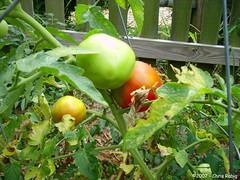 Image by FadderUri via Flickr
Image by FadderUri via Flickr
Every year, thousand of chemicals are poured into the environment and millions of gallons of water are needlessly wasted. How? By growing plants. Sure, most of this is done by large agricultural producers, but some of it is still done in personal gardens. And that means that you can make a difference by changing your gardening practices. There are many agricultural producers who have done it, and you can use the same tricks to help your own garden, and the planet.
Pick appropriate plants. Not all plants are appropriate for the area you live in. While you might be able to control the temperature, humidity, and rain conditions inside your house, you can’t do it out in the garden. If you pick appropriate plants for your area, you may be able to avoid using fertilizers and saving on water too. Research, what plants are native to your surrounding areas and try planting them in your own garden. Wildflowers, are just that, they can pretty much be left alone and will thrive in most areas.
Pick natural repelling plants. You don’t need to rely on poisons to keep away garden ruining pests. Many plants produce chemicals that repel these animals naturally. By putting them in or around you garden, you can keep your garden safe with little effort and no chemicals. Plus, you can pick parts of these plants and use them to make products to keep them away from you too.
If you don’t want to plant natural repellents in your garden, you can use them to spray your plants without harming them or adding artificial chemicals to your garden. Many herbs like hot pepper, vanilla, and lavender can help repel insects from your garden.
Pull weeds. We’re all looking for a quick and easy way to safely get rid of weeds without chemicals, but the good old fashioned way is still very effective. It you take time every day to pull the weeds you can find, you’ll only take a few minutes so it doesn’t seem like a lot of work. You can even get the kids involved, just be sure to do it properly so you don’t spread the seeds around. There are even some common weeds that are edible, just make sure there are no pesticides that could have gotten on them.
You can use this same concept in your garden by planting different plants every year, or just rotating where you put specific plants in the garden.
So, you’ve made all these changes and are using a low-water, chemical free garden? Well, you still haven’t done the most important thing: pass it on! One garden can make a dent, but more can make a bigger difference. Tell your friends, teach your kids, you can even visit their school and teach your kids friends! Every little bit helps make a better world.
Pick appropriate plants. Not all plants are appropriate for the area you live in. While you might be able to control the temperature, humidity, and rain conditions inside your house, you can’t do it out in the garden. If you pick appropriate plants for your area, you may be able to avoid using fertilizers and saving on water too. Research, what plants are native to your surrounding areas and try planting them in your own garden. Wildflowers, are just that, they can pretty much be left alone and will thrive in most areas.
Pick natural repelling plants. You don’t need to rely on poisons to keep away garden ruining pests. Many plants produce chemicals that repel these animals naturally. By putting them in or around you garden, you can keep your garden safe with little effort and no chemicals. Plus, you can pick parts of these plants and use them to make products to keep them away from you too.
If you don’t want to plant natural repellents in your garden, you can use them to spray your plants without harming them or adding artificial chemicals to your garden. Many herbs like hot pepper, vanilla, and lavender can help repel insects from your garden.
Pull weeds. We’re all looking for a quick and easy way to safely get rid of weeds without chemicals, but the good old fashioned way is still very effective. It you take time every day to pull the weeds you can find, you’ll only take a few minutes so it doesn’t seem like a lot of work. You can even get the kids involved, just be sure to do it properly so you don’t spread the seeds around. There are even some common weeds that are edible, just make sure there are no pesticides that could have gotten on them.
 Image via Wikipedia
Image via Wikipedia
You can use this same concept in your garden by planting different plants every year, or just rotating where you put specific plants in the garden.
So, you’ve made all these changes and are using a low-water, chemical free garden? Well, you still haven’t done the most important thing: pass it on! One garden can make a dent, but more can make a bigger difference. Tell your friends, teach your kids, you can even visit their school and teach your kids friends! Every little bit helps make a better world.
![Reblog this post [with Zemanta]](http://img.zemanta.com/reblog_e.png?x-id=147209c1-ad2d-4ebf-bab8-c46989f65f68)
No comments:
Post a Comment